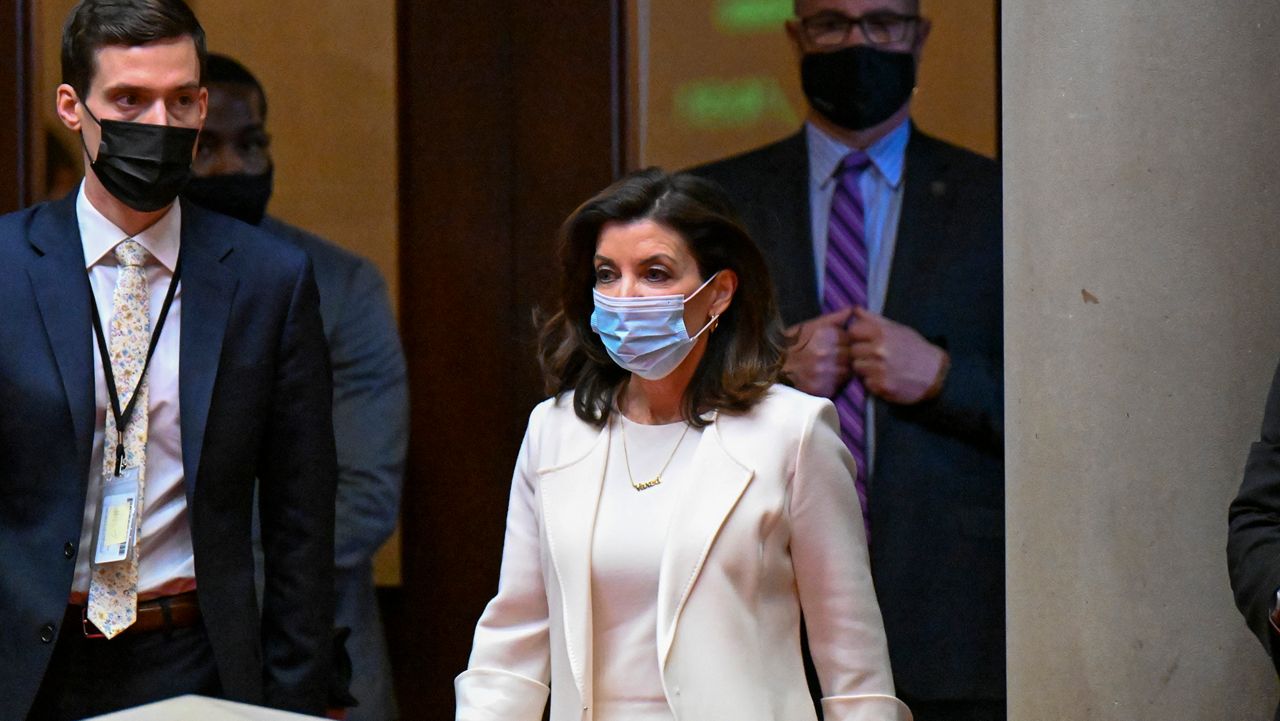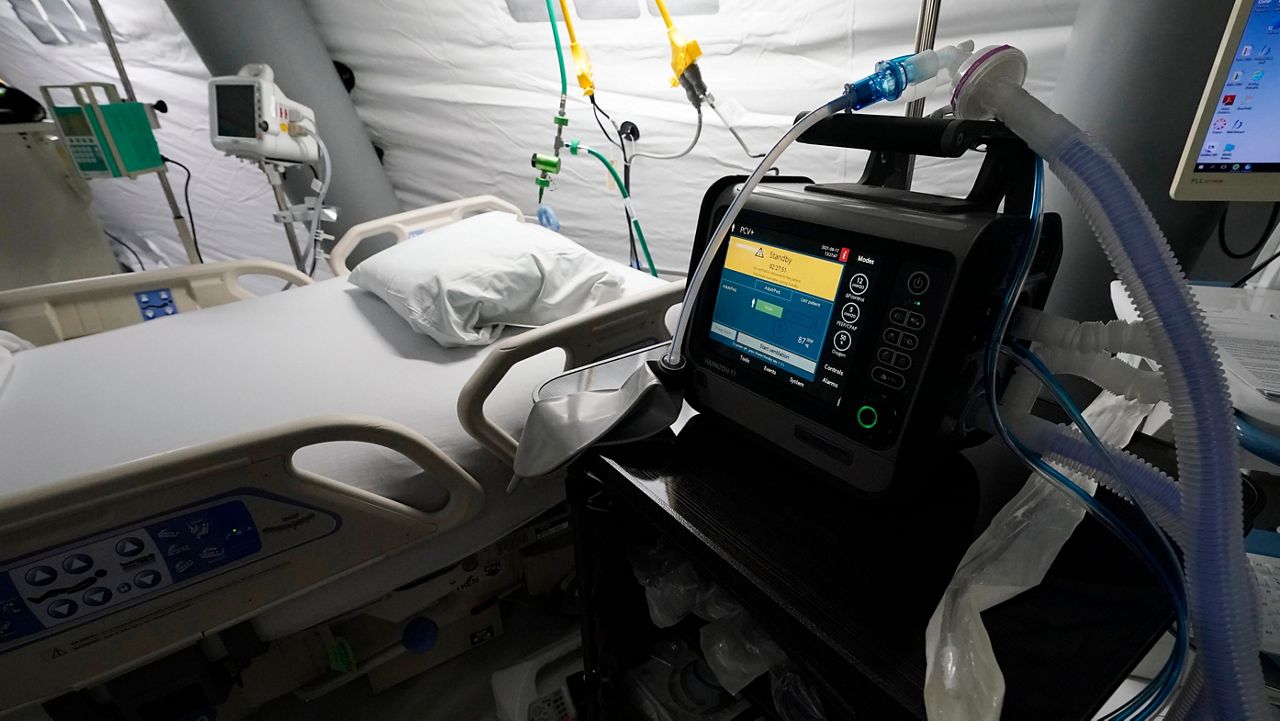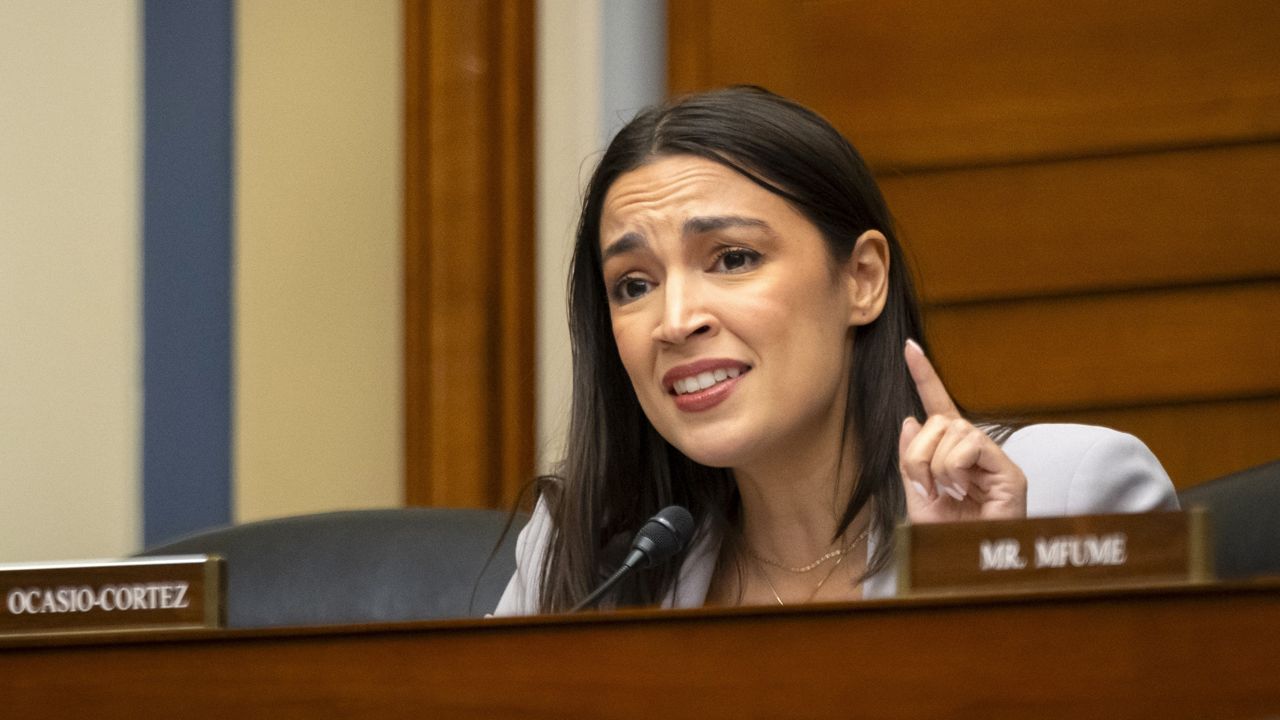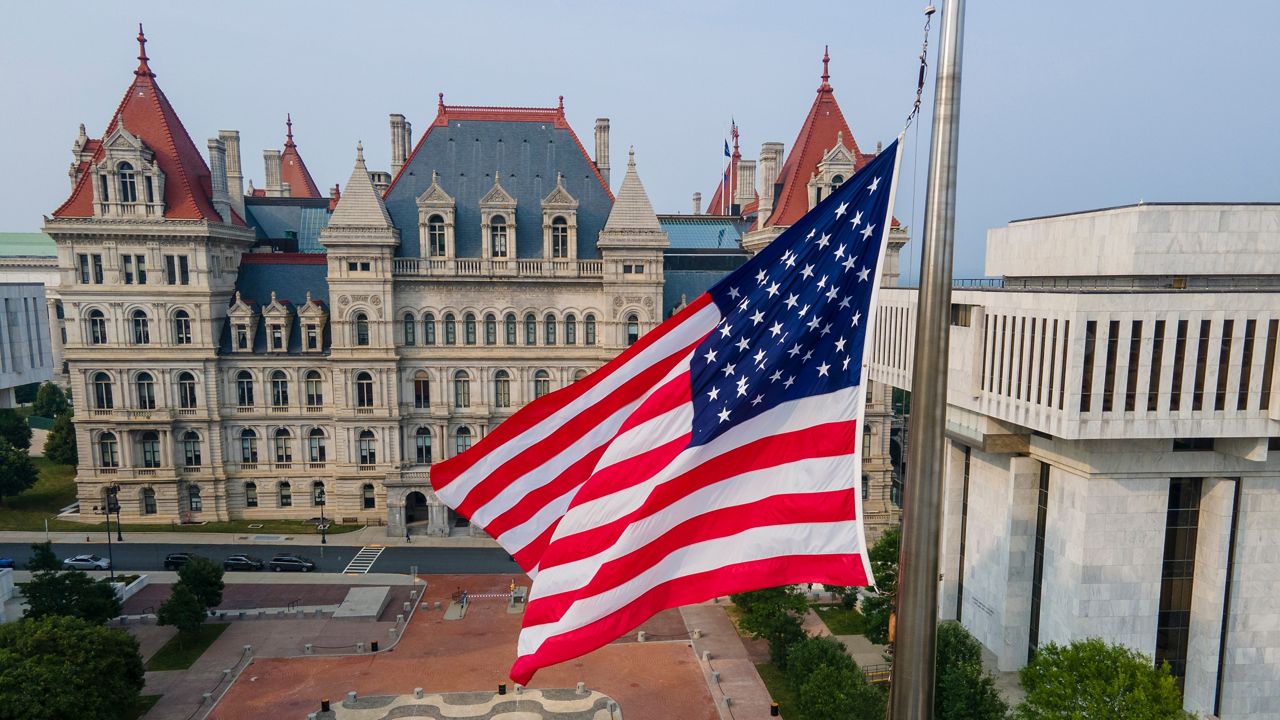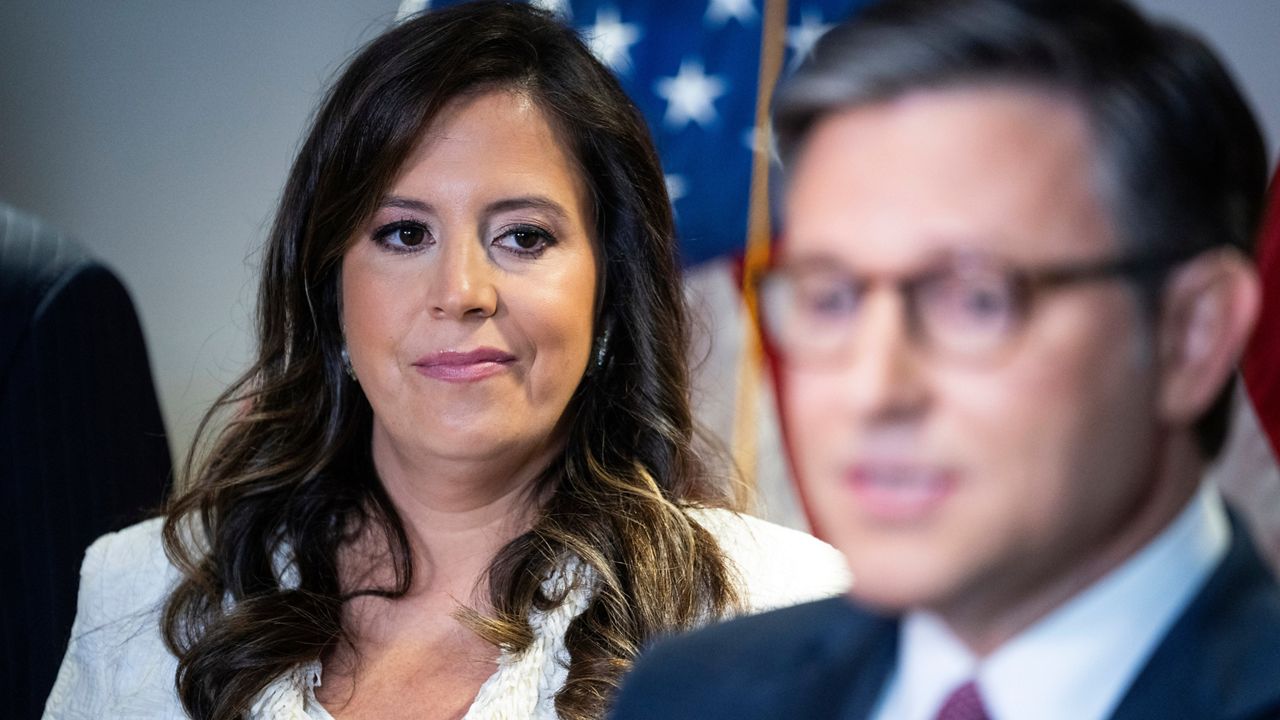Gov. Kathy Hochul is set to unveil her first budget proposal of her tenure on Tuesday, laying out a roadmap for how New York state will spend approximately $200 billion in the next year.
The budget proposal is often considered where the rubber meets the road in Albany, and will determine how the state plans to fund schools and health care in the coming months, impacting the lives of millions of New Yorkers along the way.
Here are nine things to watch for in the budget when it's presented at 11 a.m.:
Education
Last year, the newly elected Democratic supermajorities in the state Senate and Assembly flexed their muscle and won a long-sought progressive goal: Increasing direct education aid by $1.5 billion, with much of the money meant to aid smaller, and less wealthy schools.
Hochul has already indicated she intends to follow through with a second year of funding that education advocates have sought, and a lawsuit over the issue is winding down in the courts.
But what's next for schools? Advocates this year are pressing for an expansion of pre-kindergarten and after-school programs statewide.
One group, the New York State Network for Youth Success, wants millions of dollars more committed to existing after-school programs.
“Governor Hochul has demonstrated the political will to transform child care in New York. Directly funding afterschool programs is key to successful change,” said Kelly Sturgis, chief executive officer of the New York State Network for Youth Success. “School districts and community providers must join forces to expand afterschool opportunities for working families. Together, we can reduce the education gap and build resiliency in a generation of children who have survived so much.”
Schools, of course, have been a focal point of concern during the pandemic, and will likely continue to be with staffing shortages and concerns a contagious variant of COVID could lead to closures.
Hochul last week announced more than 60 million additional COVID tests will be heading to schools in the state in order to keep them open.
Higher education
Hochul plans to revamp the state's public college and university system. But how that overhaul will take shape is not entirely clear. Her predecessor, former Gov. Andrew Cuomo, used the SUNY system, in part, as an economic development vehicle, building up campuses in Buffalo, Utica and Albany along the way.
Already, the plan that Hochul has in mind will not include SUNY Chancellor Jim Malatras, who left the job this month.
The next chancellor will have to implement whatever the governor wants to do with the SUNY system, while at the same time addressing the fall student enrollment amid the COVID-19 pandemic.
Health care
The costliest item in the state budget, and perhaps the one item that affects the largest number of people in the state. Hochul has already announced in her State of the State agenda she wants to greatly increase the ranks of the state's health care workforce and is backing a pay increase as well.
It's music to the ears of powerful labor unions like the New York State Nurses Association as well as 1199SEIU.
But it's also a potential boon to hospital networks that have been struggling to retain workers in recent months, and the surge in COVID cases has made that all the more complicated.
Meanwhile, Hochul is facing calls from insurers as well as immigration advocates to make it easier for undocumented New Yorkers to be eligible for health insurance. The move could help pave the way to extending health care coverage to about 200,000 people living in New York -- part of the million or so people who represent the "last mile" of the uninsured.
Asked about this last week, Hochul demurred to the legislative process.
Caring for the most vulnerable
And speaking of pay raises, advocates for home care workers in New York are also calling for a pay raise this year.
At issue has been yet another shortage of workers in a field that cares for the state's most vulnerable residents.
A bill that would give home care workers a raise has reached critical mass in the state Legislature, with majorities in both chambers backing it.
“It is imperative in New York State that we look after our community’s elderly and most vulnerable members. That is why I am proud to support the Fair Pay for Home Care Act,” said Assembly Majority Leader Crystal Peoples-Stokes. “This legislation will help to address home care shortages and ensure that essential home care workers are paid fair wages. I would like to thank all the cosponsors and supporters for their leadership in fighting to help end the home care staffing crisis.”
Taxes
New York is flush with cash, thanks in part to federal money as well as the state's wealthiest residents paying more in taxes following last year's budget agreement.
Hochul has already announced she wants to continue forward with tax cuts aimed at middle-income earners, and potentially accelerate it in this year's budget.
At the same time, she's shown little desire to increase the tax rate on those at the upper end of the tax bracket. New York state relies on a relatively small cadre of very rich people, mostly New York City dwellers, for revenue from the personal income tax.
Much is made every year over whether the state's tax climate is contributing to an outmigration, especially of the wealthy few who shoulder much of the state's tax burden.
Still, progressives will likely press for further tax actions in this year's budget to help fund their priorities.
Economic development
In one of her first public appearances last year after she was elevated to the governor's office, Hochul told a gathering of business leaders she is not necessarily wedded to the regional economic development councils that had been championed by Cuomo.
So far, no clear difference has emerged on how Hochul wants to spur job creation, a task made all the more difficult by the unpredictability of the pandemic. New York shed 2 million in the first weeks of the crisis in 2020, and its recovery has not been as fast as other parts of the country.
Tourism and hospitality -- especially in New York City, the state's economic powerhouse -- have been hit the hardest.
Good-government organizations are urging Hochul to take a hard look at the state's web of economic development programs and tax incentives, which are often opaque and do little in the way of job creation, as she takes on the issue.
Infrastructure
Hochul's predecessor wanted to go big on infrastructure. Airports, bridges, tunnels -- anything that seemed like a mega structure, and Cuomo made it a priority.
The new governor has shown a willingness to be just as interested, and her focus has been on expanding rail and transportation networks. She has already announced support for projects like addressing Buffalo's Kensington Expressway, I-81 in Syracuse and the Cross-Bronx Expressway.
But the costliest may be a new rail service plan connecting Brooklyn and Queens, connecting 14 miles of old and unused right-of-way.
"As I said, infrastructure is about connections," she said earlier this month. We need to reconnect neighborhoods that were severed by asphalt highways, disproportionately impacting communities of color."
Green infrastructure
One of the first crises Hochul was handed on the job was massive flash flooding in the New York City region following the remnants of a hurricane passing through the area. Small tributaries like the Bronx River and Sprain Brook flooded adjacent parkways. Forty-three people over a four-state area died.
Hochul is being urged by environmental organizations to go big on green infrastructure -- the kinds of infrastructure that would mitigate the most harmful effects of climate change and extreme weather, as well as projects to curtail it, such as energy-efficient buildings and charging stations for electric vehicles.
A Bills stadium?
What's New York's number one Buffalo Bills fan to do with the push for a new stadium for the state's only professional football team?
Hochul has demurred so far on how much taxpayers -- some of whom may not be Bills fans -- will be footing for a new stadium for the team. Hochul's budget could lay out financing arrangements for a Bills stadium in Erie County and get the ball rolling on a potential replacement this year.
Stadium financing deals with public funding can be extraordinarily complex and messy. It's partially why the Jets still play in New Jersey.




